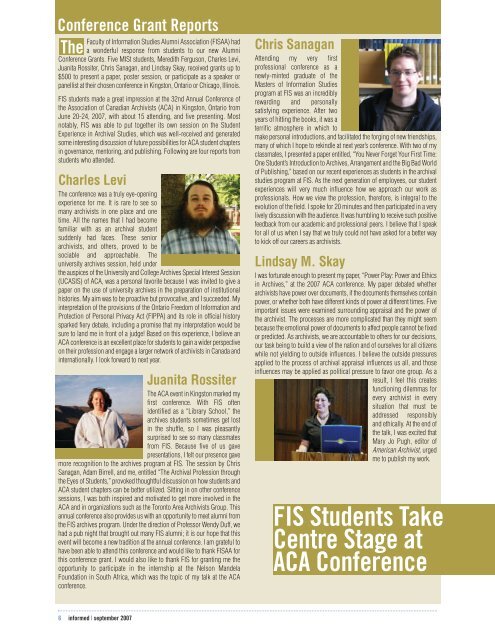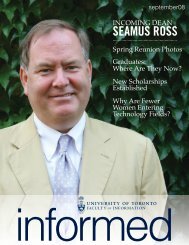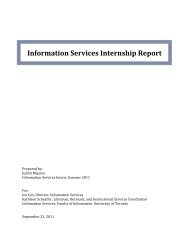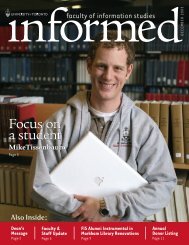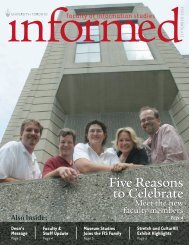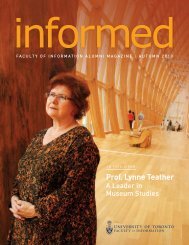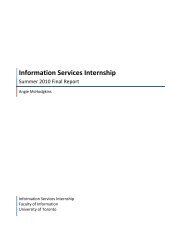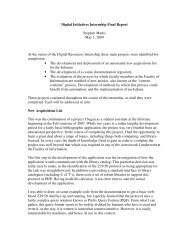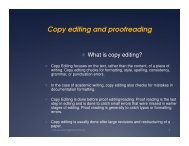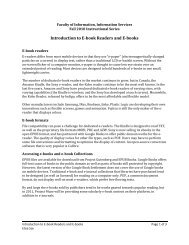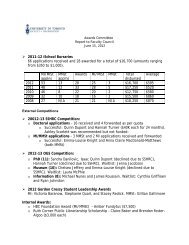Fall 2007 - Faculty of Information - University of Toronto
Fall 2007 - Faculty of Information - University of Toronto
Fall 2007 - Faculty of Information - University of Toronto
You also want an ePaper? Increase the reach of your titles
YUMPU automatically turns print PDFs into web optimized ePapers that Google loves.
Conference Grant Reports<br />
The<br />
<strong>Faculty</strong> <strong>of</strong> <strong>Information</strong> Studies Alumni Association (FISAA) had<br />
a wonderful response from students to our new Alumni<br />
Conference Grants. Five MISt students, Meredith Ferguson, Charles Levi,<br />
Juanita Rossiter, Chris Sanagan, and Lindsay Skay, received grants up to<br />
$500 to present a paper, poster session, or participate as a speaker or<br />
panellist at their chosen conference in Kingston, Ontario or Chicago, Illinois.<br />
FIS students made a great impression at the 32nd Annual Conference <strong>of</strong><br />
the Association <strong>of</strong> Canadian Archivists (ACA) in Kingston, Ontario from<br />
June 20-24, <strong>2007</strong>, with about 15 attending, and five presenting. Most<br />
notably, FIS was able to put together its own session on the Student<br />
Experience in Archival Studies, which was well-received and generated<br />
some interesting discussion <strong>of</strong> future possibilities for ACA student chapters<br />
in governance, mentoring, and publishing. Following are four reports from<br />
students who attended.<br />
Charles Levi<br />
The conference was a truly eye-opening<br />
experience for me. It is rare to see so<br />
many archivists in one place and one<br />
time. All the names that I had become<br />
familiar with as an archival student<br />
suddenly had faces. These senior<br />
archivists, and others, proved to be<br />
sociable and approachable. The<br />
university archives session, held under<br />
the auspices <strong>of</strong> the <strong>University</strong> and College Archives Special Interest Session<br />
(UCASIS) <strong>of</strong> ACA, was a personal favorite because I was invited to give a<br />
paper on the use <strong>of</strong> university archives in the preparation <strong>of</strong> institutional<br />
histories. My aim was to be proactive but provocative, and I succeeded. My<br />
interpretation <strong>of</strong> the provisions <strong>of</strong> the Ontario Freedom <strong>of</strong> <strong>Information</strong> and<br />
Protection <strong>of</strong> Personal Privacy Act (FIPPA) and its role in <strong>of</strong>ficial history<br />
sparked fiery debate, including a promise that my interpretation would be<br />
sure to land me in front <strong>of</strong> a judge! Based on this experience, I believe an<br />
ACA conference is an excellent place for students to gain a wider perspective<br />
on their pr<strong>of</strong>ession and engage a larger network <strong>of</strong> archivists in Canada and<br />
internationally. I look forward to next year.<br />
Juanita Rossiter<br />
The ACA event in Kingston marked my<br />
first conference. With FIS <strong>of</strong>ten<br />
identified as a “Library School,” the<br />
archives students sometimes get lost<br />
in the shuffle, so I was pleasantly<br />
surprised to see so many classmates<br />
from FIS. Because five <strong>of</strong> us gave<br />
presentations, I felt our presence gave<br />
more recognition to the archives program at FIS. The session by Chris<br />
Sanagan, Adam Birrell, and me, entitled “The Archival Pr<strong>of</strong>ession through<br />
the Eyes <strong>of</strong> Students,” provoked thoughtful discussion on how students and<br />
ACA student chapters can be better utilized. Sitting in on other conference<br />
sessions, I was both inspired and motivated to get more involved in the<br />
ACA and in organizations such as the <strong>Toronto</strong> Area Archivists Group. This<br />
annual conference also provides us with an opportunity to meet alumni from<br />
the FIS archives program. Under the direction <strong>of</strong> Pr<strong>of</strong>essor Wendy Duff, we<br />
had a pub night that brought out many FIS alumni; it is our hope that this<br />
event will become a new tradition at the annual conference. I am grateful to<br />
have been able to attend this conference and would like to thank FISAA for<br />
this conference grant. I would also like to thank FIS for granting me the<br />
opportunity to participate in the internship at the Nelson Mandela<br />
Foundation in South Africa, which was the topic <strong>of</strong> my talk at the ACA<br />
conference.<br />
Chris Sanagan<br />
Attending my very first<br />
pr<strong>of</strong>essional conference as a<br />
newly-minted graduate <strong>of</strong> the<br />
Masters <strong>of</strong> <strong>Information</strong> Studies<br />
program at FIS was an incredibly<br />
rewarding and personally<br />
satisfying experience. After two<br />
years <strong>of</strong> hitting the books, it was a<br />
terrific atmosphere in which to<br />
make personal introductions, and facilitated the forging <strong>of</strong> new friendships,<br />
many <strong>of</strong> which I hope to rekindle at next year’s conference. With two <strong>of</strong> my<br />
classmates, I presented a paper entitled, “You Never Forget Your First Time:<br />
One Student’s Introduction to Archives, Arrangement and the Big Bad World<br />
<strong>of</strong> Publishing,” based on our recent experiences as students in the archival<br />
studies program at FIS. As the next generation <strong>of</strong> employees, our student<br />
experiences will very much influence how we approach our work as<br />
pr<strong>of</strong>essionals. How we view the pr<strong>of</strong>ession, therefore, is integral to the<br />
evolution <strong>of</strong> the field. I spoke for 20 minutes and then participated in a very<br />
lively discussion with the audience. It was humbling to receive such positive<br />
feedback from our academic and pr<strong>of</strong>essional peers. I believe that I speak<br />
for all <strong>of</strong> us when I say that we truly could not have asked for a better way<br />
to kick <strong>of</strong>f our careers as archivists.<br />
Lindsay M. Skay<br />
I was fortunate enough to present my paper, “Power Play: Power and Ethics<br />
in Archives,” at the <strong>2007</strong> ACA conference. My paper debated whether<br />
archivists have power over documents, if the documents themselves contain<br />
power, or whether both have different kinds <strong>of</strong> power at different times. Five<br />
important issues were examined surrounding appraisal and the power <strong>of</strong><br />
the archivist. The processes are more complicated than they might seem<br />
because the emotional power <strong>of</strong> documents to affect people cannot be fixed<br />
or predicted. As archivists, we are accountable to others for our decisions,<br />
our task being to build a view <strong>of</strong> the nation and <strong>of</strong> ourselves for all citizens<br />
while not yielding to outside influences. I believe the outside pressures<br />
applied to the process <strong>of</strong> archival appraisal influences us all, and those<br />
influences may be applied as political pressure to favor one group. As a<br />
result, I feel this creates<br />
functioning dilemmas for<br />
every archivist in every<br />
situation that must be<br />
addressed responsibly<br />
and ethically. At the end <strong>of</strong><br />
the talk, I was excited that<br />
Mary Jo Pugh, editor <strong>of</strong><br />
American Archivist, urged<br />
me to publish my work.<br />
FIS Students Take<br />
Centre Stage at<br />
ACA Conference<br />
6 informed | september <strong>2007</strong>


